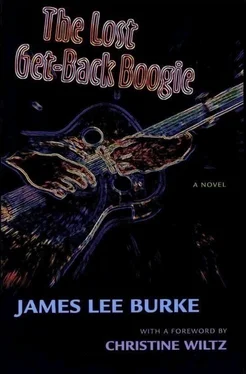Mine was a middle-aged man who had transferred from the welfare agency. He wore dark J. C. Higgins suits even in the summertime, and there were blue and red lines all over his cheeks and nose. His blunt hands were too large for the fountain pen and papers that he tried to handle, and his stomach pressed the flap of his fly outward as though he had a hernia. I had known him around town most of my life, in an indirect way, because he belonged to almost every civic organization in the parish, or at least you could always find him on the edge of newspaper photographs showing the sponsors of civic drives to promote American Legion baseball or a new park that would include areas for colored citizens.
My file perplexed him. He said he couldn’t fully understand how a man who had been decorated with two Purple Hearts and a Bronze Star could also receive a bad-conduct discharge. Also, he didn’t think it was a good plan for me to go to Montana. My family was in south Louisiana, and both my brother and sister could help me get started in business or whatever I would choose, since I had two years’ college education at Southwestern Louisiana Institute. His thick thumb dented and creased the papers in my folder, and his eyes wandered over my face in his abstraction as he talked about the inadvisability of leaving home roots and the possibilities of working with my brother. He ignored my open smile at the thought of an ex-convict in the employ of a public-relations and advertising company.
I had put on a pair of slacks and a sport shirt and had gotten a shine at the newsstand before coming into his office, but as I looked at his well-meaning face and clear blue eyes that didn’t fit the dark suit, and listened to the recommendations for my future, I wished that one of the bosses from Angola were there in his place, someone who had felt the same miserable touch of the prison farm that left a salty cut in the edge of your eye. Or at least someone whom you didn’t have to con.
Because that was what he wanted. I had already talked with a state supreme court judge, a friend of my father’s, who said he would push all the paper through Baton Rouge to get me an out-of-state parole. Also, Buddy Riordan, who had pulled time with me, had gotten his father to sponsor me with the Office of Parole and Probation in Missoula. But we still had to go through with the con.
The strange thing about conning a man who deliberately opens his vest to a series of lies is the fact that both of you have to protect him from knowledge of his own dishonesty. In this case my parole officer recorded every insult to his intelligence without an eyelid faltering over the movement of his pen, but occasionally the hand would pause and an eyebrow would lift off the paper to register some abstract discrepancy in my account, a small warning that would keep us both honest tomorrow.
So we went through it. I would like to do ranch work up in Montana, dig postholes in frozen ground, shave sheep with electric barber clippers, dehorn cows, wring the necks of chickens and shuck their feathers in pots of scalding water, shovel boxcar loads of green horse manure in one-hundred-degree heat.
Actually, most of what I told him was true. I did want to go to Montana and live on a ranch in the mountains with Buddy and buck bales on a new morning. But I couldn’t tell him that most of all I just needed to roll, to flee the last two years of my life, to exorcise from my sleep the iron smell of jail and the clack of the count man’s baton against my cell door.
I knew that the parole transfer might take weeks or longer to be approved in Baton Rouge, and I had only thirty-five dollars left from my discharge money. My father had left each of the children one-third of the farm, but he had borrowed against it twice, and an oil company was claiming that four acres of it was somehow part of a royalty pool. Which meant, in effect, that there was a legal cloud over the house and land title, and before the estate could be divided, we would have to settle in or out of court with Texaco as well as deal with the bank. Ace was the only one of us who had the combination of what it took to wait it through: money, a disregard for time, and an ambitious energy for the profits to be made in land development.
And Ace stayed right on top of it. Two days after my father was buried, he had his agency’s lawyer draft a quitclaim settlement on the inheritance for Rita and me to sign. He drove his Cadillac up the front lane one afternoon while I was on the porch steps tuning my Dobro, and began explaining in his serious way the advantages of settling the estate now. I didn’t feel like talking with him or listening to his practical statements of figures and legality. And his self-deluded attitude of magnanimity was more than I could stand at the moment.
He offered me five thousand dollars in exchange for the quitclaim and power of attorney. I drank out of my beer and set the can down on the step.
“I tell you what, Ace. Get your lawyer to draw up another one, and give me the old man’s truck and four of the back acres by the bayou. You can have the rest of it, and I’ll sign the oil rights over to you, too. But don’t put any of your tract homes near my property.”
“You’re cutting yourself short,” he said.
“That’s all I need, Bro’.”
I had cut myself short, but I couldn’t take any money from him, and I felt better at evening off any debt I owed for my father’s care. And inside he was very happy because he had gone through his act of generosity and fairness and later would realize a fortune in the subdivision of the land.
So in a moment’s irritation I had become an equal member of the family at a large cost: I was still broke and had taken to buying sardines and soda crackers with my six-packs of beer at the little store down the dirt road.
Sunday morning I drove to New Iberia and looked up Rafe Arceneaux, the tea-head singer in our band. He was married now, with twin boys, and working ten days on and five off as a radio man on an offshore oil rig. We sat on the wood porch of his small house and drank chicory coffee in the clang of church bells and the screams of his kids and the loud voice of his wife in the back of their house. The triangular scar from the barroom fight was raised like an inner-tube patch on his forehead.
“I wish I could say something helpful, man, but it’s bad right now,” he said. “Most of the old guys are gone. Bernard’s wife got him locked up for nonsupport, Archie got busted for possession in Pascagoula, and the rest of us catch a gig when we can. They only want rock ’n’ roll bands now, and they can get the colored guys to play cheaper than we do.”
“How about the Victory Club?”
“Some of the local punks burned it down while you were gone.”
His wife came through the screen door and put one of his diapered boys in his lap without speaking to either of us. The screen slammed shut after her. Rafe directed his embarrassed eyes at the line of dilapidated storefronts across the street. “She’s mad because I wouldn’t take her to her mother’s last night. It’s one of those things you have to live with when you play it straight.”
I finished my coffee and started to leave, because his wife’s anger hadn’t been directed at him but me, the ex-convict and bad influence out of his past.
“Hey, don’t cut out yet, Iry. Look, I’m sorry about all this. It’s just that things aren’t the same anymore. I mean, ten years ago we all thought we’d be playing Nashville by this time. Sometimes it just doesn’t work out. Let’s face it, man — we’re getting to be history.”
I finally found a job working four nights a week at a roadhouse outside of Thibodaux. They didn’t really need a lead-guitar man, but when I opened my case and took out the Dobro, I had the job. A Dobro is a bluegrass instrument, inlaid in the sound box with a metal resonator and played flat with a bar like a steel guitar, and you don’t see many of them outside the southern mountains. I had bought mine on order from El Monte, California, for four hundred dollars, and the thin neck and gleaming wood of the box was as light as an envelope of air in my hands.
Читать дальше












